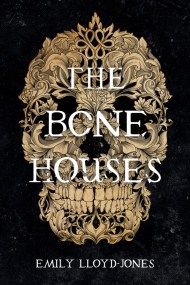Cover Reveal: The Bone Houses by Emily Lloyd-Jones
Hello, it’s me again, raving about the work of Emily Lloyd-Jones. Let me sell you on her latest work, The Bone Houses. It’s a story that is the perfect blend of history, fairytales, horror, and a badass female protagonist. Aderyn (“Ryn”) is a seventeen-year-old who works as a gravedigger in the village of Colbren with the knowledge that the dead don’t always stay dead. The undead, or as Ryn calls them, the bone houses, were manageable for her until Ellis, a mapmaker, came along and drew the risen corpses with him. Together, they go on a journey to dispel the curse and to discover hidden truths about themselves.
This read will have you enchanted because Emily Lloyd-Jones has outdone herself yet again, and just looking at the cover will give you chills. But before I show you the cover, let’s give you a little history on the bone houses with a chapter excerpt.
The mountains of Annwvyn have never welcomed humans.
They began with fire. With hills that spewed ash and flame until they rose to jagged peaks. People rarely went into them—the mountains were little more than sharp-edged slate and wind-torn trees.
It was the King of the Otherfolk, Arawn, who made his home there. Castell Sidi, a fortress of granite and enchantment, rose up beside a clear mountain lake, the Llyn Mawr. It is said he brought the magic with him—for he was immortal and lovely, and he could weave enchantments as easily as we spin wool. And where he went, other magical creatures followed.
There were the afanc, who lurked beneath the surface of rivers and watched for unwary travelers; pwca, shape-changers and bringers of fortune that might bestow luck or bring a person to ruin; and, of course, the Tylwyth Teg—the immortals. They held revels that would last decades. Heroes with enough guile to slip into Annwvyn might reemerge, their pockets heavy with gold. But there were few brave enough to try.
It was said Arawn rode with crimson-eyed hounds, and he would reap terrible retribution on anyone who interrupted a hunt. But he was not a monster. He befriended several kings—before princes ruled these lands. Those he favored found themselves with gold and health and magical trinkets. For many years, all was well.
But those gifts drew attention.
There was a man called Gwydion of the house of Dôn. He had some talent for magic and mischief—and he loved both. When his brother yearned for a maiden the king favored, Gwydion began a war between the north and south kingdoms so that his brother had time enough to seize her. And that was the least of his crimes.
Gwydion slew kings, taunted enchantresses, and befriended enough poets that tales of his exploits became known throughout the isles.
And then he turned his gaze toward Annwvyn.
He had heard of the Otherking’s wealth, of the magic and monsters that dwelt within the mountains. But rather than frighten him, those tales made him want.
So he slipped into Annwvyn and stole from Arawn.
Perhaps the ensuing war might have been averted, if Gwydion had offered some kind of apology. Most men would have cowered before the rage of the Otherking; he had red-eyed hounds, great knights, a cauldron said to raise the dead, and an undefeated champion.
Gwydion should have retreated, but he had spent years gathering power and an ego to match. He called the trees to fight for him, and in the ensuing chaos, he met Arawn’s champion.
If Gwydion had fought fairly, he would have perished. But he was a clever, wicked sort, and he did not fight.
Rather, he spoke the champion’s true name.
And broke his power.
“Wait, wait,” said Ellis, holding up his hand for silence. His elbow knocked into his cup. Ryn grabbed for it, saving the tea. “Sorry—but how does speaking a name defeat Arawn’s greatest champion?”
Ryn scowled and dragged the cup to the middle of the table. “Because names have power. Always have.”
“Enough power to defeat a champion? Why not simply lop his head off?”
“Creatures of magic,” she said, “are creatures of will. Their name is often… I don’t know. A part of that. If you could name them, if you could pin down exactly what they are, then you might be able to bend that will to your own.”
Ellis appeared unimpressed. “So if you were one of the otherfolk, I could say ‘Aderyn’ and you’d be powerless against me?”
She pointed a fingernail at him. “My name means ‘bird,’ so probably not. But if my name were Farmer, and I was a farmer, and my whole life was farming, then perhaps.”
“So it’s not just a name, then,” said Ellis. “You have to pin down their role, their identity.” He tilted his head in thought. “Maybe that’s why so many surnames have to do with occupations.”
“It wouldn’t work on humans, though,” said Ryn. “We’re too stubborn. And not magical enough.” She took a sip of her own tea, wetting her dry tongue. “Now do you want to hear the rest?”
Ellis placed a finger against his lips. “I’ll be silent as the grave.”
Furious and disgusted at the greed of men, Arawn Otherking withdrew from Annwvyn. He took his court and his treasures, and he sailed to where no human could follow. Castell Sidi was abandoned.
After three generations, most people stopped believing in magic. The rivers were dragged, and the afanc slain. The pwca starved, as the farmers who had once believed in luck, no longer laid out offerings for them.
All that was left of magic were copper coins tossed over the prow of a boat, a sprig of rowan tucked into a pocket, and always the right stocking pulled on before the left. Such small magics were repeated until their original purpose forgotten.
But there were some who did not forget.
It’s said that a man ventured into the mountains of Annwvyn. He had heard of great treasures left in the Otherking’s fortress. He knew something of magic, so he brought gifts for the last of the great monsters: he brought fresh kills to the lake Llyn Mawr to distract the afanc and gave small sweets to the pwca.
The man went to Castell Sidi, hoping to find treasure or jewels. But what he found was far more valuable: a cauldron crafted of the darkest iron, its edges stained with rust.
Most men would have scoffed at such a find, but this one recognized the worth of the cauldron, sensed the power wrought within the iron.
He took it and returned home.
When the man said the cauldron would make his fortune, people laughed at him.
The man was right.
Terribly, horribly right.
For that night, he boiled water within the cauldron. He took a cup of it to the graveyard; a young woman resided there, beneath blankets of soil and moss. He had courted her, but a sickness claimed her before he could. He trickled the water into the dead woman’s mouth, and in a heartbeat, her eyes flickered open. Her skin brightened and became new. She drew one breath, and then another, and when she could speak, she said the man’s name and smiled. She took his hand, and he pulled her from her grave.
The man brought the woman home, and her family recoiled with terror. She should have been dead—they knew that. But the man hastily explained: he had found the cauldron of rebirth within Annwvyn.
Word spread. People flocked to the man, begged him to save their lost loved ones. And he did—for a price. The man and the woman dwelt in wealth and happiness, and she bore him a child.
But word reached the nearby cantref princes. When they learned of the cauldron, they imagined wars won before a single arrow was fired. No one would dare attack a kingdom if its armies could not fall.
At first, the cantref princes were kind to the man. They sent gifts for his child, sacks of gold, promises of land and titles. The man smiled and rejected them all.
When kindness did not achieve their ends, the princes began to bargain. It was simply too dangerous to have such a magic, they insisted. If the cauldron fell into the wrong hands, it would be a weapon. Surely the man wanted it to be protected?
The man said he could protect it.
And then the soldiers arrived.
For if they could not cajole or bargain for the cauldron, the princes would simply take it.
The village was put to flame. Many perished in the fires, including the man. His wife took their young son and the cauldron, and then she fled. There would be no safe place for them—at least, not in the tamed lands.
She retreated into the mountains, retracing her husband’s path to Castell Sidi. She took refuge in the old fortress, hoping that the forest and the mountains would keep her small family safe.
However, the cantref princes did not give up. They sent knights and soldiers into the mountains. Those that did not perish in the wilds found their death when they tried to cross the lake Llyn Mawr. After the soldiers failed, the princes sent spies—and their corpses joined the soldiers’ in the lake.
But one of the princes was shrewd. He did not send a soldier nor a spy.
He hired a thief. A man with quick fingers and an even quicker mind. He looked at those wilds like they were just another house to break into, and he made a plan. He covered himself in dirt and leaves, made a coat of animal pelts so that the beasts would let him pass. He crossed the wilds unseen and unheard, and when he approached the lake Llyn Mawr, he did so with care.
He waited for twilight, when the evening could trick the eye, and then he pushed a log into the lake and swam alongside it. He looked like a rotting piece of tree floating across the water.
When his bare feet touched the graveled shore, the thief remained low. He notched an arrow, raised his bow. There was someone walking outside the fortress.
The man was a thief—so he did what all thieves do. He took.
Only this time, what he took was a life.
The figure fell, arms flailing as if unsure what had happened, and it was then the thief realized that the form was too small to be the woman.
Dread filled his heart as he approached and saw what he had slain. It was a child.
The woman rushed from Castell Sidi. When she saw what had happened, she hit the thief over the head with a rock and carried her child inside.
The child was dead, but she could save him.
She had never used the cauldron but she knew how it was done—boiling water within its depths.
But the thief had awoken. He followed the woman into the castle and saw the cauldron. He seized the cauldron. For a moment, man and woman struggled over the cauldron, water sloshing back and forth within its depths.
Then it cracked.
Water spilled across the floor—the last water it would ever hold. The woman fell to her knees, trying to scoop the water into her hands, but it slipped through her fingers and sank into the floor.
The thief ran. His sodden shoes carried some of the magical water with him, and when he slipped into the lake, the power seeped into the Llyn Mawr.
When night fell, the surface of the lake quivered. A bone-tipped hand emerged from its waters. Figures draped in tattered clothing and rusted armor dragged themselves ashore.
The things that crawled from the lake were sinew and rotting flesh. They were silent, with hollow eyes and bodies that caved in.
They were called bone houses.
Can I please get this painted on my living room wall??







